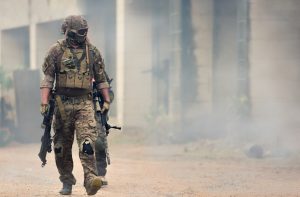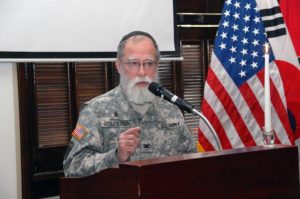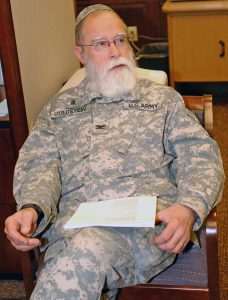G.I. Jacob
Bosnia. Ground Zero. Afghanistan. Guantanamo Bay. South Korea.
These are among the many places in which Crown Heights resident Rabbi Jacob Goldstein served as chaplain for the United States Army, a 38-year stint which also included dancing with Jewish soldiers in Saddam Hussein’s palace on Simchas Torah.
Born in a displaced persons camp in Paris after World War II, Rabbi Goldstein’s career as a soldier began in the unlikeliest of ways: at the recommendation of a Roman Catholic priest.
“It was in 1967 just days before the Six Day War, and the Lubavitcher Rebbe spoke publicly at a Lag B’Omer parade for kids,” Rabbi Goldstein told The Jewish Echo. “He went on to say that when Jews put on tefillin and women light Shabbos candles, they can take on the world.”
Rabbi Goldstein was not yet 21 when he heard those words, and he and a group of friends gathered in yeshivah to discuss the Rebbe’s directive.
“Those were powerful words, almost like marching orders,” recalled Rabbi Goldstein. “We tried to figure out ways that we could make it happen.”
The Vietnam War was in full swing at the time, with many young Jewish soldiers trying to get into the Army National Guard and the Army Reserve as a way of avoiding some of the more dangerous combat zones. The group elected to visit an army base near West Point where they were told that there were many Jewish soldiers reporting every Sunday for training, in the hopes of persuading them to put on tefillin.
Working the phones, Rabbi Goldstein managed to get in touch with Father Ed Donovan, a Roman Catholic priest who oversaw all of the chaplain services for the New York National Guard. He invited Rabbi Goldstein and his friends to visit Camp Smith every Sunday, saying that he would make sure that all of the Jewish soldiers attended.
“It worked out very well,” recalled Rabbi Goldstein. “When we got there, there was a sergeant who would tell all the Jewish soldiers that the rabbis were here to take their blood pressure. People had no idea what tefillin were.”
Fast forward eight years and Rabbi Goldstein found himself married with small children and still making the occasional visit to Camp Smith. It was during one of those weekends when Father Donovan made the suggestion that would forever change the course of his life.
“He said to me, ‘You know rabbi, what you do is great. The soldiers love the services. Why don’t you just go ahead and put on the uniform,’” said Rabbi Goldstein.
As with any other major decision in his life, Rabbi Goldstein turned to the Lubavitcher Rebbe, Rabbi Menachem Mendel Schneerson, for advice. A note written by Rabbi Goldstein to the Rebbe that same night received a two-word response: “nachon hadavar” – it is the correct course of action.
Rabbi Goldstein’s wife, the daughter of a shaliach, was supportive of his decision, while his mother, a Holocaust survivor, was less so.

“I went to the house for the first time in uniform, and she opened the door and just looked at me,” said Rabbi Goldstein. “When I was in high school she would tell me that I needed a month in the army to straighten myself out. Now she looked at me and said in Yiddish, ‘oy, you took me seriously.’”
Rabbi Goldstein never told his mother about his tour of duty in Germany, knowing that it would be difficult for her to come to terms with him defending the Germans against the Russians. At one point in time, Rabbi Goldstein went to East Berlin. There he spoke with the commanding officer who had been rescued from a ghetto and who told him in Yiddish, “Can you imagine? These people tried to kill me, and now we are protecting them.”
Over the course of his career, Rabbi Goldstein raised some eyebrows in the army when he wore a camouflage yarmulke with his military fatigues. His refusal to shave his beard was problematic at first and nearly had him leaving the service until he was finally granted a religious exemption. While kosher ready-to-eat meals were not initially available, in time the army began stocking them to accommodate Jewish soldiers, even on Pesach.
Throughout his military career, which ended three years ago with his mandatory retirement at age 68, Rabbi Goldstein was called upon to serve Jewish soldiers in a variety of ways. In 1999 he was serving in Bosnia during the Yamim Nora’im. He received a call on Erev Yom Kippur asking for his help acquiring and sending a lulav and esrog to Macedonia, some 500 miles away, to the second-highest ranking officer, who just happened to be Jewish. While in previous years, a lulav and esrog had been sent from Israel, the ongoing intifada made that year’s shipment problematic.
“We figured out that if the point of origin was New York, we could send the lulav and esrog via diplomatic pouch and it should arrive on time,” recalled Rabbi Goldstein. “I waited up until 4 A.M. on Motzoei Yom Kippur and made the arrangements, and the lulav and esrog got there just hours before Succos.”
But the story of the Macedonian lulav and esrog didn’t end there.
“The Macedonian officer told me that he was walking to shul, a distance of about three miles, holding the lulav and esrog, with a military escort following behind,” said Rabbi Goldstein. “Suddenly an older man charged him, grabbing the lulav and esrog and holding it close to his chest, crying. The man hadn’t seen a lulav and esrog in 60 years since the Nazi invasion, and he was emotionally overcome at the opportunity to fulfill the mitzvah.”
In his tour of duty Rabbi Goldstein had the remarkable opportunity to celebrate several Yamim Tovim at Saddam Hussein’s presidential palace in Baghdad after the Iraqi leader’s capture in 2003. Rabbi Goldstein built a succah, lit the menorah on Chanukah, read the megillah on Purim and ran Pesach Sedarim on the grounds of Hussein’s massive compound that included well over three dozen buildings, gardens, lakes, and greenhouses in addition to the lavish main palace.

But not all of Rabbi Goldstein’s deployments were to far-flung locations. He spent four and a half months serving as the senior chaplain for all military branches at Ground Zero after the September 11th terror attacks. Nearly 17 years later he still gets emotional speaking about that period in his life, describing it as a combat zone much like those he experienced overseas.
“Walking through there every single day, that sight has never left my head,” said Rabbi Goldstein.
While Rabbi Goldstein says that he is, baruch Hashem, healthy despite the extended time he spent at Ground Zero, he remains on a military watch list and has his health monitored with semi-annual testing. Rabbi Goldstein still has the boots that he wore in the aftermath of 9/11 in his basement, and although soldiers are indoctrinated with lessons on keeping their boots neatly polished, his remain covered in the dust and the ash that blanketed Ground Zero. A concrete reminder of an unprecedented chapter in United States history, Rabbi Goldstein’s boots have been unworn since his time at Ground Zero, and he wondered aloud if perhaps they should be buried as they likely contain dust particles containing human remains.
Rabbi Goldstein recalled blowing shofar at Ground Zero on Rosh Hashanah, shaking hands with President George Bush when he toured the World Trade Center site just days after the attack, and easing the mind of a grieving mother who adamantly refused to leave the site until she was allowed inside the perimeter marked by authorities for civilian safety.
“I opened up the barricade and got her a chair so that she could sit there, and by merely opening the barricade she calmed down tremendously,” recalled Rabbi Goldstein. “I spent well over an hour with her, and she cried and told me about her son. It was my small contribution to this big and terrible story.”
In another instance, Rabbi Goldstein was contacted by a cousin regarding 9/11 victim Abe Zelmanowitz who had been singled out by President Bush for his heroism, refusing to leave the burning building without helping a quadriplegic colleague that he had befriended over the years.
“A relative of Zelmanowitz’s had been in shul the previous Shabbos sobbing hysterically – the shloshim was approaching, and there was no body, no levaya, and no way to get near the site,” said Rabbi Goldstein. “My cousin asked if I could help the family, telling me that doing so would guarantee my entrance to Gan Eden after 120.”
It took time to work out the necessary arrangements, but on the night of the shloshim, Rabbi Goldstein met with a small group of family members at the corner of Rector Street and escorted them to Ground Zero.
“They opened the barricades for us and as we walked by, every rescue worker we passed saw me and saw the civilians, and they understood that it was almost as if we were going to a levaya,” recalled Rabbi Goldstein. “They all bent their heads, took off their helmets and put them to their hearts in a sign of respect. It was a very, very powerful moment.”
Rabbi Goldstein took the family to the corner closest to Tower 1 were Zelmanowitz had worked for Blue Cross.
“We davened Maariv, and then it was time to say Kaddish. As his brother in law started saying Kaddish, I collapsed,” said Rabbi Goldstein. “It was the first time I was able to let go and express everything that had been building up inside me for the past 30 days.”

Years later at a 9/11 memorial at Ground Zero, the Zelmanowitzs told Rabbi Goldstein that they would never forget what he had done for them.
“I was just trying to ease their burden,” said Rabbi Goldstein.
Looking back on his career, Rabbi Goldstein said that while he is glad to be free of the paperwork that was part of his job, he misses working with the soldiers that he used to interact with on a daily basis. He considers it to have been a privilege to have been the longest-serving chaplain in military history.
“I am honored to have been able to contribute my piece to American history,” said Rabbi Goldstein. “When my grandchildren ask me about 9/11 or the places I have been I tell them that they should understand that their Zeidy served in uniform, providing religious support to those who needed his services.”
Sandy Eller is a freelance writer who writes for numerous websites, newspapers, magazines and many private clients. She can be contacted at sandyeller1@gmail.com.
You must be logged in to post a comment.